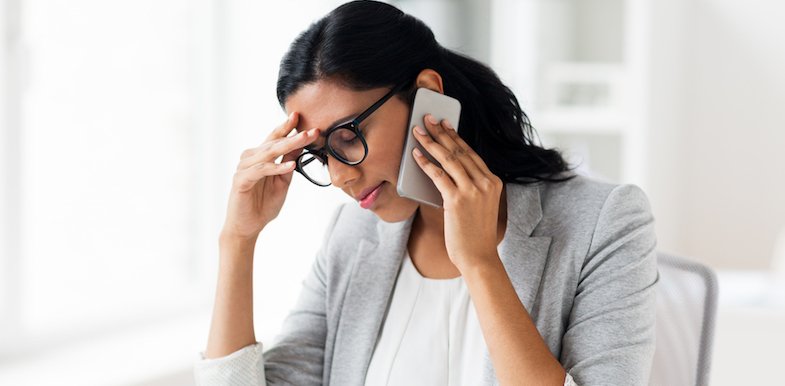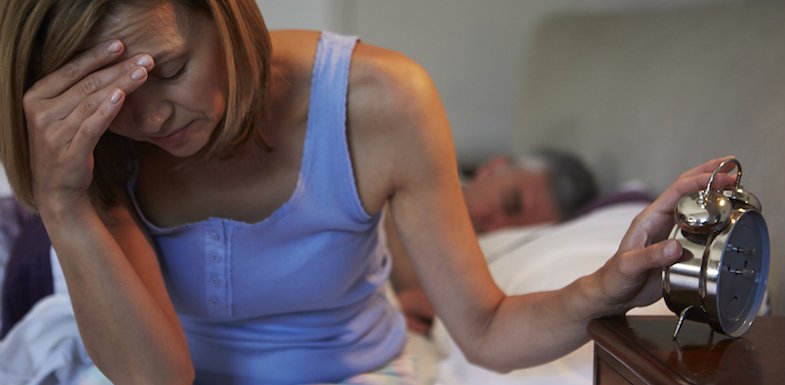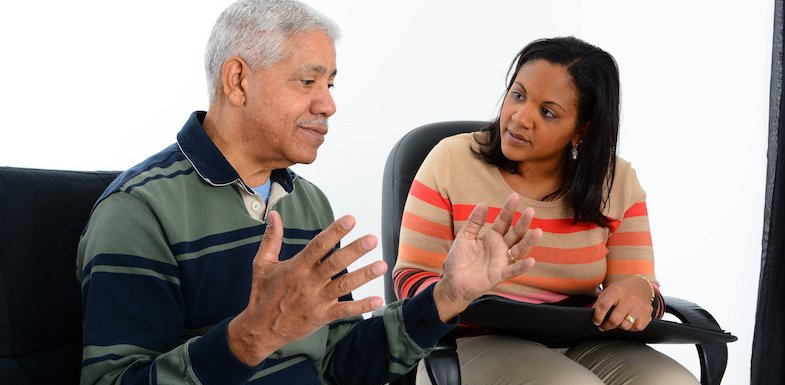
If you suffer from anxiety, you’re not alone. If you’re a pain patient, you should know that anxiety and pain are often interrelated. Anxiety itself is the most common mental health issue, according to the Anxiety and Depression Association of America (ADAA). About 18% of all U.S. adults suffer from an anxiety disorder, and about one-third of people don’t receive treatment. Even more difficult, up to 45% of pain patients may suffer from anxiety. Although difficult to live with, anxiety is one of the most treatable mental illnesses with the right help. Successful treatment is especially important for people living with chronic pain. Anxiety can worsen or even cause some types of pain, including headaches or back pain. Anxiety may also worsen or cause fatigue, intensifying symptoms of conditions like fibromyalgia.
What is anxiety?
Anxiety is essentially amplified fear that often develops while anticipating events or situations. It’s a normal human emotion that may precede scary or celebratory happenings, like surgery or weddings. But sometimes feelings of anxiousness grow larger and interfere with daily living.
When anxiety makes it difficult to carry out the basic tasks of living, mental health experts consider it a mental illness. Even people without full-blown anxiety disorders may find fear, tension, and worry decreasing quality of life or exacerbating chronic pain symptoms.
Although treatable, anxiety is complex. Let’s take a look at the different types.
Panic disorder
This type of anxiety may lead to sudden feelings of terror with no overt cause or warning sign. Panic attacks may develop. These involve:
- Chest pain
- Sweating
- Heart palpitations
- General feelings that one is about to lose their mind
Some symptoms may be confused with the onset of a heart attack. This can cause even more anxiety if the person experiencing panic believes they may have a serious health problem.
Anxiety is usually not related to an underlying health problem, but can sometimes be a symptom of heart disease, diabetes, or thyroid problem, according to Mayo Clinic.
Social anxiety disorder
In some people, anxiety may manifest as a fear of interacting with people, entering social situations, or in severe cases, even leaving the house.
People experiencing social anxiety disorder may worry about being judged by others or feel so much tension over what to say, wear, or act that the entire interaction becomes a stressful situation they believe is better avoided.
Generalized anxiety disorder
One of the more common anxiety conditions, generalized anxiety disorder involves tension and worry about everyday living concerns.
People with generalized anxiety may always expect the worst to happen, and because of that, experience uncontrollable thoughts racing through their heads playing out various scenarios of impending doom. Areas of concern may range from work, family, money, or school, but this type of anxiety usually involves circular thinking about worst-case scenarios.
Symptoms may include muscle tension, headaches, fatigue, and nausea.
What are common anxiety symptoms?
While anxiety may result in various conditions, underlying symptoms include:
- Excessive worry
- Difficulty sleeping
- Indigestion
- Tension headaches
- Jaw, neck, and shoulder pain
However, these physical symptoms barely touch the surface of this condition. People with anxiety may become so overwrought by the things on their to-do list, for example, that they’re unable to move, instead just sitting and thinking about all the things they have to do and how little time there is to do them.
Anxiety may involve laying in bed at night, worrying about a mistake at work, which turns into mental scenes preparing for a clash with your boss that will probably never happen. As it escalates, your mind may blank as it succumbs to feelings of sheer terror or panic, and you may not be able to think, only feel nervous of what’s to come.
This underlying tension or nervousness is what people refer to with the term “anxiety.” With all the pressures we face day-to-day, increasing numbers of people are suffering from anxiety. While medications are sometimes used to help manage it, more and more people are turning to holistic methods of controlling stress and changing the thought patterns that lead to anxiety.
What causes anxiety?
Researchers are investigating the potential for a biological cause of anxiety. While no clear answers have been found, scientists point to a cocktail of genes, stress, diet, and pollution, according to Healthline. Some people are more likely than others to develop anxiety, including:
- Women
- People who suffer from other mental health conditions, like depression
- Those who abuse drugs
- People who have experienced a life trauma such as abuse, violence, or a serious health scare
- Patients with chronic illnesses, like chronic pain
The pressure of living with chronic pain could very well lead to anxiety, making it important to seek help if you’re feeling tense, nervous, or restless.
Fear is a natural reaction to life’s difficult times, but sometimes that fear spirals out of control, resulting in anxiety. When learning to combat anxiety, a goal is to learn to manage fear and develop healthy ways of responding to triggers. Without tools to manage fear and nervous thoughts, those thoughts take over the mind, repeating obsessively and creating tension.

What is the link between anxiety and pain?
Many people with chronic pain experience anxiety, and people with anxiety sometimes develop chronic pain, according to ADAA. Headaches are a good example of anxiety leading to pain. Anxiety may lower a person’s tolerance for pain, intensifying discomfort from arthritis or fibromyalgia.
Feeling fear related to chronic pain is understandable since it impacts your quality of life. You may not be able to care for yourself as completely as you wish, or need help with tasks like cooking or walking.
The long-term nature of chronic conditions also creates uncertainty. You don’t know when, or if, your condition will improve. Fear and anxiety is natural, but learning how to manage it is important to reduce pain.
The link between anxiety and pain is so strong that some doctors believe pain patients should automatically be screened for a related disorder, according to research published in the journal General Hospital Psychiatry. Researchers say that while the link between pain and depression is well known, pain’s connection to anxiety is not.
Scientists surveyed 250 patients and found 45% of them reported at least one anxiety disorder. Those with anxiety experienced more severe pain and worse quality of life, underscoring the imperative for pain patients to receive treatment for their anxiety.
Researchers said it’s important for patients to receive cognitive behavioral therapy to learn new ways of thinking. Dr. Roger Chou, who participated in the study, says:
“Just throwing pain medications at someone like this (with anxiety) doesn’t tend to be very effective since you’re not dealing with an important driver of the pain.”
How can you treat anxiety?
Anxiety is a horrific feeling, but fortunately, many remedies are available to help relieve tension and find peace. Treatments for tension range from meditation to medication, from completely natural to pharmacological and everything in between. Not only will these help with your anxiety, many of these treatments are appropriate for anxiety and pain symptoms.
Here are six treatments for anxiety you may find helpful.
1. Meditation
Meditation is the practice of sitting still, breathing, and focusing on the breath while observing thoughts that arise, not following them. So, for example, if you think, “I’m really bored,” while meditating, you would just let that thought go and return your attention to the breath instead of following it up with thoughts of, “am I doing this right?” or “does this really work?”
The practice may sound overly simple or complex depending on your point of view, and it may seem strange at first that sitting in a quiet place and breathing may help calm anxiety. However, an increasing number of studies demonstrate the powerful effects.
A review of 47 studies published in JAMA Internal Medicine found that meditation helps lessen anxiety, as well as depression and pain. People meditating for as little as 2.5 hours each week saw a benefit. That’s an average of 21 minutes per day.
The power of meditation lies in its ability to teach people to stay in the present moment. Anxiety typically involves concerns about the future, so staying in the present moment and learning to watch thoughts, instead of identify with them, helps practitioners distance themselves from feelings of fear.
For optimal results, meditation should be practiced daily, but you don’t need to start with 20-minute intervals. Try sitting for five minutes and work your way up to an amount of time that works for you. For a primer with meditation instructions, click here.
2. Therapy
Therapy is a commonly used treatment for anxiety, and it’s important. A frequently used type known as cognitive behavioral therapy is wonderful for teaching people how to develop new ways of thinking about ongoing problems.
Psychiatrists can help you learn to change your thoughts about daily struggles that cause anxiety. These new thinking patterns, either alone or in conjunction with other therapies, can reduce the amount of worry you feel.
If, for example, you go into certain situations thinking, “I always mess up,” talk therapy can help you identify those patterns and help you change the inner dialogue to something more supportive.
Talk therapy is one of the most effective treatments for anxiety because it targets the cause of the problem, and not just the symptoms like medication does, according to HelpGuide.org. Research from Johns Hopkins found therapy even more beneficial than medication for treating social anxiety disorder, and therapy lasts for a long time, unlike medication that stops working after the body processes it.

3. Exercise
Scientists have long known that exercise benefits physical health, but studies increasingly show fitness benefits mental health, too. Researchers still aren’t sure exactly how exercise works in the brain as a treatment for anxiety, but the link is strong enough to consider working out a proven, effective way to reduce tension, according to Mayo Clinic.
Exercise triggers the brain to release happiness-inducing chemicals known as endorphins and elevates body temperature, which Mayo Clinic says may reduce anxiety. Meanwhile, it gives you something outside yourself to focus on. This takes your mind off your worries and onto those weights you’re lifting or stairs you’re climbing.
4. Acupuncture
Acupuncture, a centuries-old Chinese medical practice of inserting thin needles into specific points along the body, is gaining recognition as a treatment for anxiety.
In Chinese medicine, practitioners believe life energy, known as qi but pronounced “chee,” runs through the body in invisible lines known as meridians. When energy becomes stuck or stagnant, disease may follow. With anxiety, the kidney or spleen meridians may have deficiencies of this life energy, according to the University of Maryland.
Inserting the acupuncture needles into places along either of those meridians helps to clear these areas of stuck qi and promote health.
5. Herbs
Herbs are an ancient, time-tested method of helping to relieve anxiety. One caveat is that some types of herbs may interact with medications you’re taking so it’s always best to consult with your healthcare provider before using them.
One helpful herbal treatment for anxiety is a root herb called kava. Sold as a tea, this powerful beverage helps to soothe frayed nerves and promote restful sleep, according to Healthline. Kava has been long used by Pacific Island indigenous cultures that have passed their traditions down through the centuries.
Chamomile, which comes from a flower, is also sold commercially in tea form and may help anxiety, according to WebMD. The supplement Ginkgo, which many use to improve memory, may also work as a treatment for anxiety, WebMD reports.
6. Medication
The number of anti-anxiety medications is vast and ever growing. Many people turn to medication to help combat severe cases of anxiety and panic attacks. They can also be a useful supplement to talk therapy or other, less-intensive forms of treatment.
While medication provides relief, it doesn’t help solve the root cause of tension, which are the thoughts creating fear, according to HelpGuide.org. Some anti-anxiety drugs like Xanax and Valium are also addictive. This could lead to a substance abuse problem on top of the anxiety. These strong drugs are benzodiazepines, a category that also includes Ativan and Klonopin.
The drugs work by quieting activity in the brain, also leading to drowsiness and diminished coordination. While many people find these medications are useful for managing anxiety, they should be taken with caution.
Other medications used for treating anxiety include some types of antidepressants, including Prozac, Paxil, and Lexapro. While these drugs have less potential for abuse, they may also take up to six weeks to begin working. Antidepressants work by regulating the neurotransmitter serotonin, and the process takes several weeks before patients feel the effects.
What treatment do you find best reduces anxiety?